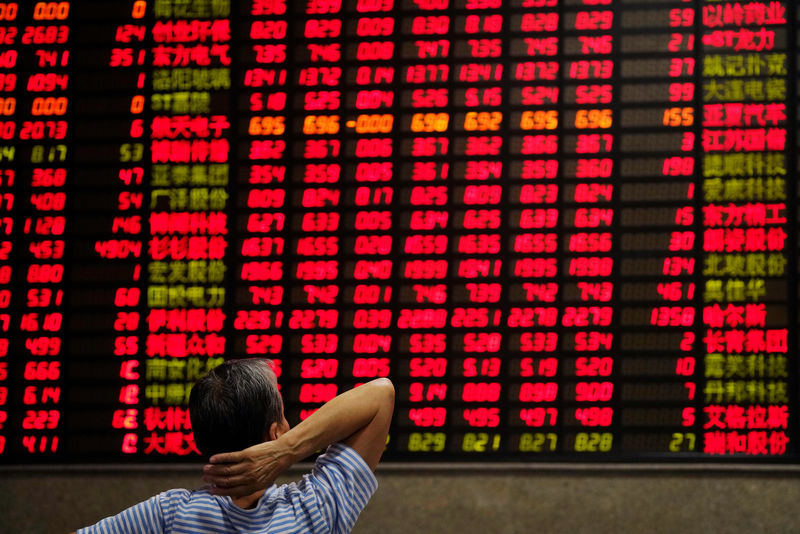 © Reuters. An investor looks at an electronic board showing stock information at a brokerage house in Shanghai
© Reuters. An investor looks at an electronic board showing stock information at a brokerage house in Shanghai
By Wayne Cole
SYDNEY (Reuters) - Asian shares found some footing on Friday after a turbulent week as China hinted at more support for its economy, amid growing expectations of aggressive stimulus from all the major central banks.
Sentiment got a lift when China's state planner said Beijing would roll out a plan to boost disposable income, though details were lacking.
A bounce in U.S. and European stock futures also helped, with E-Minis for the and the EUROSTOXX 50 each rising 0.6%.
In early European trades, Germany's added 0.7% as did futures for London's and France's .
MSCI's broadest index of Asia-Pacific shares outside Japan responded by climbing 0.4%, though it was still down 1% for the week.
Japan's recouped early losses to end a touch firmer at 0.06%, while Shanghai blue chips rose 0.3%.
"Tariffs remain the largest source of risk for equities," analysts at J.P. Morgan said in a note.
Beijing on Thursday vowed to counter the latest tariffs on $300 billion of Chinese goods.
"Existing U.S./China tariffs have weighed on corporate profits during 1H19 with S&P 500 companies delivering flat earnings growth compared to mid-single-digit trend rate prior to implementation of tariffs," J.P. Morgan analysts said.
They also downgraded estimates for 2020 earnings per share to $177 from $178 to account for the latest tariffs that will likely kick in on Sept.1.
U.S. President Donald Trump said on Thursday he believed China wanted to make a deal and that the dispute would be fairly short, despite it already lasting more than a year.
With no settlement in sight, investors have hedged against a global slowdown by buying bonds. Yields on 30-year debt hit an all-time low of 1.916% on Thursday to be down 27 basis points for the week, the sharpest such decline since mid-2012.
That meant investors were willing to lend the government money for three decades for less than the overnight rate.
Such is the gloom that surprisingly strong U.S. retail sales came and went with no impact on the bond rally.
Analysts have cautioned that the current bond market is a different beast than in the past and might not be sending a true signal on recession.
"The bond market may have got it wrong this time, but we would not dismiss the latest recession signals on grounds of distortions," said Simon MacAdam, global economist at Capital Economics.
"Rather, it is of some comfort for the world economy that unlike all previous U.S. yield curve inversions, the Fed has already begun loosening monetary policy this time."
CAVALRY COMING
Indeed, futures imply a one-in-three chance the Federal Reserve will chop rates by 50 basis points at its September meeting, and see them reaching just 1% by the end of next year.
There were plenty of other signs the cavalry were coming.
European Central Banker Olli Rehn on Thursday flagged the need for a significant easing package in September.
Markets are keyed for a cut in the deposit rate of at least 10 basis points and a resumption of bond buying, sending German 10-year bund yields to a record low of ‑0.71%.
"Notions that the package will include a revamped QE program also saw a sharp rally in Italian, Spanish and Portuguese debt," said Tapas Strickland, a director of economics at National Australia Bank.
"If the ECB undertakes such substantive stimulus, it is unlikely to do so alone given the upward pressure it would put on the U.S. dollar."
Mexico overnight became the latest country to surprise with a cut in rates, the first in five years.
Canada's yield curve inverted by the most in nearly two decades, piling pressure on the Bank of Canada to act.
All the talk of ECB easing knocked the euro back to $1.1096 and away from a top of $1.1230 early in the week.
It was last down 0.1% at $1.1104, helping lift the up to 98.217 and off the week's trough of 97.033.
The dollar could make little headway on the safe-haven yen, though, and idled at 106.14 yen.
The collapse in bond yields continued to make non-interest paying gold look relatively more attractive and the metal held at $1,514.6, just off a six-year peak.
Oil prices were trying to bounce after two days of sharp losses. futures added 65 cents to $58.88, while rose 62 cents to $55.09 a barrel.
https://www.investing.com/news/stock-market-news/asia-shares-take-heart-in-stimulus-speculation-1956738
2019-08-16 07:30:00Z
CBMiZ2h0dHBzOi8vd3d3LmludmVzdGluZy5jb20vbmV3cy9zdG9jay1tYXJrZXQtbmV3cy9hc2lhLXNoYXJlcy10YWtlLWhlYXJ0LWluLXN0aW11bHVzLXNwZWN1bGF0aW9uLTE5NTY3MzjSAQA
Tidak ada komentar:
Posting Komentar